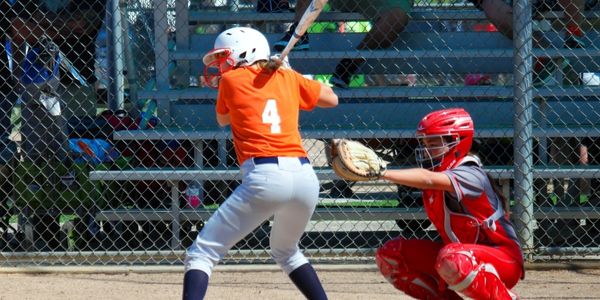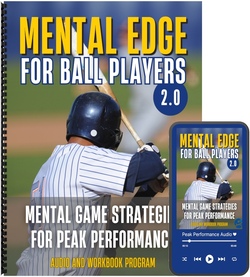Does Performance Anxiety Hurt Performance?
Performance anxiety isn’t just about nervousness; it’s a physiological and mental response to stress or pressure. When you become anxious, your heart rate increases, muscles tense, breathing shortens, and your ability to focus narrows.
When you are ill-equipped to manage anxiety, even routine plays become increasingly difficult. It is important to understand the causes of performance anxiety, so you can implement strategies to manage and reduce your anxiety.
4 Common Causes of Performance Anxiety
- Fear of Failure – Some players worry about letting down teammates, coaches, family, or fans, especially in clutch moments of a game.
- Unrealistic Self-Expectations – Some players chase perfection or hold themselves to unrealistically high standards. Excessively high expectations increase the pressure to perform to overwhelming levels.
- Fear of Being Judged Negatively – Some players feel they are being constantly judged and worry about losing their role on the team or embarrassing themselves on the field.
- Focus on Past Mistakes – Anxious players often fear repeating past mistakes, slipping into slumps, or experiencing mental performance blocks.
Recognizing the early warning signs of anxiety and understanding the root causes are the first steps to regaining emotional control.
Twenty-three-year-old Los Angeles pitcher Roki Sasaki arrived in the major leagues with much hype. As a high schooler in Japan, Sasaki was throwing above 100 mph. By the age of twenty, Sasaki was pitching professionally in Japan and dominating.
On January 22, 2025, Sasaki signed a contract with the Los Angeles Dodgers, including a 6.5 million signing bonus. Shortly after his signing, Baseball America and MLB.com named Sasaki the No. 1 prospect in the MLB.
After an impressive spring training, Sasaki made the Dodgers’ opening day roster. The expectations were through the roof for Sasaki, with many team officials believing Sasaki could be one of the best pitchers in baseball this season.
Sasaki acknowledged he was nervous and uncertain of where he was as a pitcher and how he would perform in the big leagues. However, Sasaki has managed his nerves by taking things one day at a time.
What did Sasaki say?
SASAKI: “Inside, I’m really nervous. Until I throw in the major leagues, I won’t know what I’m lacking or what I have to do to perform well.”
Sasaki’s acknowledgment of being “really nervous” is a reminder that all players battle nerves at one time or another.
The key is how you respond to it. If you focus on fear, nerves will turn into anxiety. However, if you focus on the present and work to develop strategies to manage anxiety, you can minimize the pressure to perform and play at your peak.
Performance anxiety in baseball is something every player faces at some point. Whether you’re stepping onto the mound or into the batter’s box, the pressure to perform can feel overwhelming.
The good news? You don’t have to let anxiety control your game. Here are a few tips to help you overcome performance anxiety.
Five Ways to Deal with Performance Anxiety on the Field
Here are five ways to manage nerves and stay focused under pressure.
1. Acknowledge Performance Anxiety
Start by being honest with yourself. It’s normal to feel nervous before a game. Even professional players deal with it. Performance anxiety doesn’t mean there’s something wrong with you. It means you care.
Instead of pretending you’re not nervous, accept it. When you acknowledge the feeling, you take away some of its power.
2. Recognize the Signs of Anxiety on the Field
Anxiety shows up in different ways. You might notice:
- Sweaty palms
- A racing heartbeat
- Tight muscles
- Negative thoughts
- Trouble concentrating
These are your body’s warning signs. Recognizing them early helps you respond before anxiety affects your performance. Think of these signs as your internal alert system.
3. Understand the Cause of Your Performance Anxiety
Ask yourself: What am I really afraid of?
Common causes include:
- Fear of failure
- Fear of letting others down
- Worrying about stats or scouts
- Overthinking results instead of focusing on the process
Once you know the cause, you can take steps to change your mindset. Understanding your anxiety is the first step toward managing it.
4. Know the Difference Between Nerves and Anxiety
Feeling nervous is normal. In fact, it can help you play better by boosting focus and energy.
But performance anxiety is different. It creates doubt, tightens your body, and interferes with your focus.
The key is to recognize the difference. Use nerves as motivation—but don’t let anxiety take control of your game.
5. Practice Mental Strategies to Manage Stress
You train your body—now train your mind. These mental tools help reduce performance anxiety in baseball:
- Deep breathing between pitches
- Positive self-talk
- Visualization of success
- Simple routines to stay present
Practice these skills every day, not just during games. That way, they become second nature when pressure is high
Conclusion: Take Control of Your Mental Game.
Performance anxiety in baseball is common—but it’s also manageable.
Start by recognizing your symptoms, understanding the causes, and using mental strategies to stay calm and confident. With practice, you can turn nerves into fuel for peak performance.
Need extra support? A mental performance coach can help you build the tools to stay focused, relaxed, and ready—one pitch at a time.
Related Sports Psychology Articles
- How to Overcome Slumps in Baseball
- Are Your Trying too Hard at the Plate When Hitting?
- How this Yankee Manages Losses in the World Series
*Subscribe to The Sports Psychology Podcast on iTunes
*Subscribe to The Sports Psychology Podcast on Spotify
The Mental Edge for Ball Players (Digital Download)
“The Mental Edge for Ball Players” audio and workbook program teaches you to get a competitive edge in baseball and softball by overcoming a lack of focus, low self-confidence and other mental game obstacles. Learn practical mental strategies to improve your performance in competition.
“A quick note to let you know how effective your programs worked for my son who is 17 and plays varsity baseball in VA. In late 2009, I ordered the “Relaxed Athlete Program” for my son because I saw he was pressing too hard at the plate and had disappointing results for his season. Thanks to your programs, my son now has a completely new approach to the game of baseball (and school) and it’s more fun for him now. He made all-district player at his position and hit .443 this season. A complete 180 degree turn around from last year.”
~Mark M., Sports Parent



